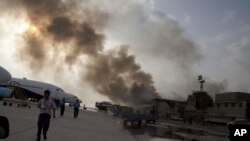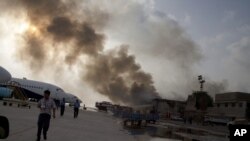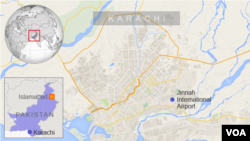ISLAMABAD —
The Pakistani Taliban is claiming responsibility for Sunday night’s deadly assault on the country’s largest international airport in Karachi that left at least 28 people dead, including 10 “terrorists” and more than a dozen security personnel.
Authorities say that just before midnight a group of around 10 heavily armed militants, some wearing military uniforms, infiltrated an old terminal at Karachi’s busy Jinnah International Airport.
Suspected Taliban insurgents carrying automatic weapons, hand grenades and rocket launchers shot their way into the facility, which is used mainly for cargo and executive flights.
The audacious coordinated assault triggered an intense five-hour gun battle with security forces guarding the terminal that lasted into Monday morning.
The army said the airport had been secured by dawn Monday.
Flights to Karachi were diverted to other airports as troops joined elite commandos in trying to counter the assault.
An eyewitness who lives nearby spoke with Reuters.
He said loud sounds were coming from the direction of the airport. He and his family saw small fires erupting around the hangars and the firing was so intense it looked like war had broken out between India and Pakistan.
The head of the provincial paramilitary force called Rangers told reporters in Karachi that three militants wearing suicide vests blew themselves up while the rest were killed by security forces.
Major-General Rizwan Akhtar added that bodies of the “terrorists” and documents seized from the scene are being examined to determine their identity.
The general says an initial probe suggested the attackers were foreigners, probably fugitive citizens belonging to the Central Asian republic of Uzbekistan.
Analysts describe the Uzbek militants as an integral part of the Pakistani Taliban entrenched in Pakistan’s Waziristan tribal territory on the Afghan border.
The Tehreek-e-Taliban Pakistan, an alliance of militant groups waging a bloody insurgency against the state, later claimed responsibility.
A spokesman for the outlawed extremist organization said the attack was conducted in response to recent military strikes against their strongholds along the Afghan border.
Provincial health authorities say the violence wounded more than two dozen people, some seriously. They added that no passengers suffered casualties and planes at the terminal were unharmed.
Critics say the airport attack has dealt a critical blow to Prime Minister Nawaz Sharif’s efforts to negotiate a peace settlement with the Pakistani Taliban. The floundering peace process is already under fire from civil society and progressive groups.
Nawaz condemned the attack.
Talks would be 'futile'
Former Pakistani air Vice Marshal Shahid Latif said a dialogue with a group that is working only to destabilize the country will lead the government nowhere.
“So the government has to realize that this is a futile effort, perhaps they know it but they still remain engaged in the process of dialogue," he said. "It [the government] suffers from indecision it has other priorities without realizing that unless there is peace and law and order situation in the country is under control the economy is not going anywhere.”
Pakistani Taliban militants have previously carried out deadly attacks against airports around the country, including military and naval airbases. However, Sunday night’s assault is being described as the biggest in terms of human losses.
Meanwhile, authorities in southwestern Baluchistan province said that the death toll in Sunday’s multiple suicide bombings in a remote town bordering Iran has risen to at least 26.
The victims were pilgrims belonging to the minority Shiite Muslim community and had just returned from Iran when four suicide bombers attacked their hotels in the town of Taftan. Authorities suspect a Sunni Muslim militant group also aligned with the Pakistani Taliban.
Baluchistan's home minister, Sarfaraz Bugti, said security forces killed one bomber while three others blew themselves up.
Authorities say that just before midnight a group of around 10 heavily armed militants, some wearing military uniforms, infiltrated an old terminal at Karachi’s busy Jinnah International Airport.
Suspected Taliban insurgents carrying automatic weapons, hand grenades and rocket launchers shot their way into the facility, which is used mainly for cargo and executive flights.
The audacious coordinated assault triggered an intense five-hour gun battle with security forces guarding the terminal that lasted into Monday morning.
The army said the airport had been secured by dawn Monday.
Flights to Karachi were diverted to other airports as troops joined elite commandos in trying to counter the assault.
An eyewitness who lives nearby spoke with Reuters.
He said loud sounds were coming from the direction of the airport. He and his family saw small fires erupting around the hangars and the firing was so intense it looked like war had broken out between India and Pakistan.
The head of the provincial paramilitary force called Rangers told reporters in Karachi that three militants wearing suicide vests blew themselves up while the rest were killed by security forces.
Major-General Rizwan Akhtar added that bodies of the “terrorists” and documents seized from the scene are being examined to determine their identity.
The general says an initial probe suggested the attackers were foreigners, probably fugitive citizens belonging to the Central Asian republic of Uzbekistan.
Analysts describe the Uzbek militants as an integral part of the Pakistani Taliban entrenched in Pakistan’s Waziristan tribal territory on the Afghan border.
The Tehreek-e-Taliban Pakistan, an alliance of militant groups waging a bloody insurgency against the state, later claimed responsibility.
A spokesman for the outlawed extremist organization said the attack was conducted in response to recent military strikes against their strongholds along the Afghan border.
Provincial health authorities say the violence wounded more than two dozen people, some seriously. They added that no passengers suffered casualties and planes at the terminal were unharmed.
Critics say the airport attack has dealt a critical blow to Prime Minister Nawaz Sharif’s efforts to negotiate a peace settlement with the Pakistani Taliban. The floundering peace process is already under fire from civil society and progressive groups.
Nawaz condemned the attack.
Talks would be 'futile'
Former Pakistani air Vice Marshal Shahid Latif said a dialogue with a group that is working only to destabilize the country will lead the government nowhere.
“So the government has to realize that this is a futile effort, perhaps they know it but they still remain engaged in the process of dialogue," he said. "It [the government] suffers from indecision it has other priorities without realizing that unless there is peace and law and order situation in the country is under control the economy is not going anywhere.”
Pakistani Taliban militants have previously carried out deadly attacks against airports around the country, including military and naval airbases. However, Sunday night’s assault is being described as the biggest in terms of human losses.
Meanwhile, authorities in southwestern Baluchistan province said that the death toll in Sunday’s multiple suicide bombings in a remote town bordering Iran has risen to at least 26.
The victims were pilgrims belonging to the minority Shiite Muslim community and had just returned from Iran when four suicide bombers attacked their hotels in the town of Taftan. Authorities suspect a Sunni Muslim militant group also aligned with the Pakistani Taliban.
Baluchistan's home minister, Sarfaraz Bugti, said security forces killed one bomber while three others blew themselves up.






